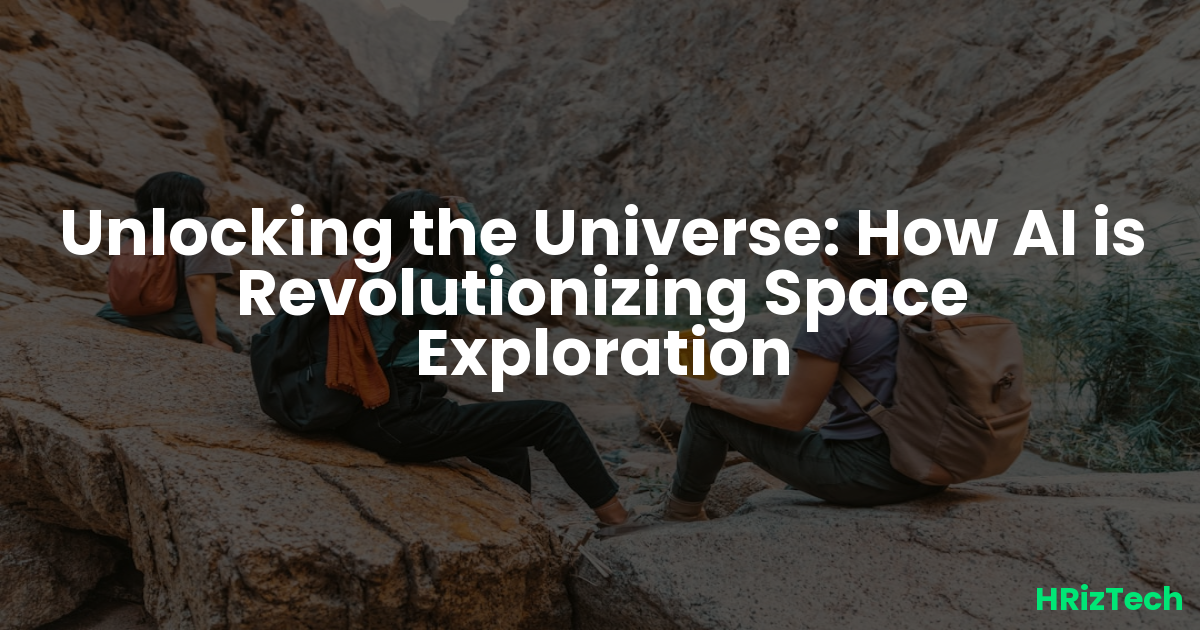Unlocking the Universe: How AI is Revolutionizing Space Exploration

Unlocking the Universe: How AI is Revolutionizing Space Exploration
Ever wonder how we'll find life on other planets, or navigate the complexities of interstellar travel? The answer, in large part, lies in the incredible advancements in Artificial Intelligence (AI). AI is no longer science fiction; it's rapidly becoming an indispensable tool in space exploration, paving the way for discoveries once deemed impossible. Let's delve into how AI is changing the cosmos, one algorithm at a time!
Why AI Matters in Space Exploration
Space exploration presents unique challenges: vast distances, extreme environments, and a sheer volume of data that's impossible for humans to process alone. AI steps in to address these hurdles. Its ability to analyze massive datasets, identify patterns, and make predictions is transforming everything from satellite imagery analysis to robotic control.
Step-by-Step Guide: AI Applications in Space
AI's role in space is multifaceted. It isn't just one thing; it's a collection of powerful tools working together. Let's explore some key applications:
1. Image and Data Analysis:
AI algorithms, particularly those based on machine learning, are exceptional at sifting through the massive amounts of data collected by telescopes and satellites. They can automatically identify celestial objects, analyze their properties, and even detect subtle changes, such as the movement of asteroids or the appearance of new galaxies. This significantly speeds up the research process and allows for discoveries that might otherwise be missed.
2. Robotic Control and Autonomy:
Sending humans to distant planets is expensive and risky. AI-powered robots offer a safer and more cost-effective alternative. These robots can navigate challenging terrains, collect samples, and perform complex tasks autonomously, guided by sophisticated AI algorithms. Think of the Mars rovers – they're amazing examples of AI in action!
3. Predictive Maintenance:
Spacecraft are incredibly complex machines. Predicting and preventing equipment failures is crucial for mission success. AI can analyze sensor data from spacecraft in real-time, identifying potential problems before they occur. This helps to extend the lifespan of expensive equipment and increases the overall efficiency of missions.
4. Exoplanet Detection:
AI is revolutionizing the search for exoplanets – planets orbiting stars other than our sun. By analyzing the light curves from stars, AI algorithms can identify subtle dips that indicate the presence of orbiting planets, even those we wouldn't be able to spot using traditional methods. This is crucial for finding potentially habitable planets.
Common Mistakes to Avoid in AI Space Projects
While AI offers incredible potential, it's important to be aware of potential pitfalls. One common mistake is expecting AI to solve every problem. AI is a tool, and it needs to be used effectively. Another issue is the lack of robust testing and validation. AI algorithms need rigorous testing before being deployed in critical space applications. Poor data quality can also significantly hamper the performance of AI systems. Data quality is paramount.
Tools and Resources for AI in Space
- Python programming language: Essential for many AI applications. Check our guide on Python basics to get started!
- TensorFlow and PyTorch: Popular deep learning frameworks used extensively in space research.
- Cloud computing platforms (AWS, Azure, GCP): These offer the computing power needed for large-scale AI projects.
Looking Ahead: AI in Space Exploration in 2025
A 2025 Gartner report predicts a significant increase in the use of AI in space exploration. We can expect to see more autonomous spacecraft, more sophisticated robotic missions, and even faster advancements in exoplanet detection. However, challenges remain. Addressing cybersecurity threats to AI systems in space will be crucial, as will ensuring the ethical use of AI in space exploration. Have you considered the ethical implications of AI-driven discoveries?
Furthermore, the integration of AI with other technologies, such as quantum computing, promises to further enhance our capabilities in space. The combination of these powerful tools could lead to breakthroughs in our understanding of the universe.
Conclusion: Embracing the AI Revolution
AI is not just changing space exploration; it's revolutionizing it. From analyzing vast datasets to controlling robotic missions, AI is becoming an indispensable partner in humanity's quest to understand the cosmos. By addressing the challenges and embracing the opportunities, we can unlock even greater discoveries in the years to come. What are your thoughts on the future of AI in space exploration? What are some other exciting applications of AI you'd like to see in the field?
Let's discuss your thoughts and ideas in the comments section below! Share this post with anyone interested in the amazing intersection of AI and space exploration.
Comments
No comments yet. Be the first to comment!